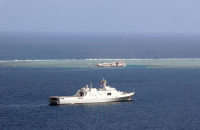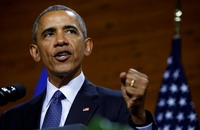China urges Philippines to immediately cease arbitral proceedings
>
http://english.cctv.com/2016/06/09/VIDESodRMnJFJdiaDZ3JKzuo160609.shtml

<<< Foreign Ministry spokesperson Hong Lei (Source: fmprc.gov.cn)
BEIJING, June 8 (Xinhua) -- China on Wednesday again urged the Philippines to stop its arbitral proceedings and return to the right track of settling relevant disputes in the South China Sea through bilateral negotiation with China.
Foreign Ministry spokesman Hong Lei made the comment at a routine press briefing.
The Foreign Ministry on Wednesday issued a statement saying that disputes between China and the Philippines in the South China Sea should be settled through bilateral negotiation.
Hong said that by unilaterally initiating the arbitration in 2013, the Philippines had turned its back on the possibility of solving the issue through negotiation, leading to a dramatic deterioration of relations between China and the Philippines.
China and the Philippines have reached consensus on settling maritime disputes through bilateral negotiation in a number of bilateral documents, but the two countries have never engaged in any negotiation on the subject-matters of the arbitration, said Hong.
By unilaterally initiating the arbitration, the Philippines has violated its agreement with China as well as its own solemn commitment in the Declaration on the Conduct of Parties in the South China Sea (DOC), he said.
This is an abuse of the dispute settlement procedures of the United Nations Convention on the Law of the Sea (UNCLOS), and is against international law, including UNCLOS, he added.
The door of China-Philippines bilateral negotiation is always open, he said. "China will remain committed to settling through negotiation the relevant disputes with the Philippines in the South China Sea on the basis of respecting historical facts and in accordance with international law."
"China urges the Philippines to immediately cease its wrongful conduct of pushing forward the arbitral proceedings, and return to the right path of settling the relevant disputes in the South China Sea through bilateral negotiation with China," Hong said. - Xinhua
BEIJING: China has urged the Philippines to “immediately cease its wrongful conduct of pushing forward the arbitral proceedings” and “return to the right path” of settling the relevant disputes in the South China Sea, through bilateral negotiation.
In an official statement released yesterday, the Foreign Ministry reaffirmed Beijing’s commitment to a settlement via two-way negotiations, rather than an arbitration unilaterally sought by Manila against China in 2013.
Ties between Beijing and Manila were sunk after the initiation of the arbitration. From the very start of the arbitral process, China has refused to accept or participate.
In the wake of recent comments made by various Chinese officials about the arbitration, the statement said “the door of China-Philippines bilateral negotiation is always open”.
Observers and the media have increasingly called on Philippine President-elect Rodrigo Duterte and his expected administration to quit the arbitration and return to the table for two-way negotiations.
The arbitral case is still pending. Some media and observers said the expected ruling by the arbitral tribunal would be made in a few weeks.
China will remain committed to settling through negotiation the relevant disputes “on the basis of respecting historical facts and in accordance with international law,” the ministry wrote.
In the past weeks, Washington has publicly pressed Beijing to accept the ruling.
That also included a call from US Defence Secretary Ash Carter on Saturday at the Shangri-La Dialogue in Singapore.
Wu Shicun, president of the National Institute for South China Sea Studies, said although it remained to be seen if the incoming Philippine administration would quit the arbitration and return to the table for talks, “it is apparent that the arbitration – from its very beginning – has led to increasing, not decreasing, number of problems between Beijing and Manila”.
“Other regional countries will come to the conclusion that embarking on such an arbitration will obtain no benefit, not to mention resolving any of the existing disputes,” Wu said.
Jia Duqiang, a researcher of South-East Asian studies at the Chinese Academy of Social Sciences, said as the arbitration process came to a critical moment, all parties knew clearly that “no good will serve any party if the big picture is damaged”.
He also said the incoming administration was re-evaluating its policies towards China. — China Daily / Asia News Network
China pushes back against US pressure
SINGAPORE: China rebuffed US pressure to curb its activity in the South China Sea today, restating its sovereignty over most of the disputed territory and saying it "has no fear of trouble".
On the last day of Asia's biggest security summit, Admiral Sun Jianguo said China will not be bullied, including over a pending international court ruling over its claims in the vital trade route.
"We do not make trouble, but we have no fear of trouble," Sun told the Shangri-La Dialogue in Singapore, where more than 600 security, military and government delegates had gathered over three days.
"China will not bear the consequences, nor will it allow any infringement on its sovereignty and security interest, or stay indifferent to some countries creating chaos in the South China Sea."
The waterway has become a flashpoint between the United States, which increased its focus on the Asia-Pacific under President Barack Obama's "pivot", and China, which is projecting ever greater economic, political and military power in the region.
The two have traded accusations of militarising the waterway as Beijing undertakes large-scale land reclamation and construction on disputed features while Washington has increased its patrols and exercises.
On Saturday, top US officials including defence secretary Ash Carter warned China of the risk of isolating itself internationally and pledged to remain the main guarantor of Asian security for decades.
Despite repeated notes of concern from countries such as Japan, India, Vietnam and South Korea, Sun rejected the prospect of isolation, saying that many of the Asian countries at the gathering were "warmer" and "friendlier" to China than a year ago.
China had 17 bilateral meetings this year, compared with 13 in 2015.
"We were not isolated in the past, we are not isolated now and we will not be isolated in the future," Sun said.
"Actually I am worried that some people and countries are still looking at China with the Cold War mentality and prejudice. They may build a wall in their minds and end up isolating themselves."
During a visit to Mongolia today, US secretary of state John Kerry urged Beijing not to establish an air defence identification zone (Adiz) over the South China Sea.
Kerry, who will visit China next, said an Adiz would be "a provocative and destabilising act", which would question Beijing's commitment to diplomatically manage the dispute.
The South China Sea is expected to feature prominently at annual high-level China-US talks starting in Beijing on Monday, also attended by US Treasury Secretary Jack Lew.
US concerns about Chinese trade policy and the difficulty foreign businesses say they face operating in China will add to what will likely be difficult discussions. — Reuters
Related:
Philippine politicians, experts, opinion leaders call for bilateral talks with China on South China Sea issue
 Studio interview: Arbitration will not solve dispute
Studio interview: Arbitration will not solve dispute
 Beijing believes Manila is politically motivated
Beijing believes Manila is politically motivated
 South China Sea FAQ 2: What are China's historical claims to the South China Sea?
South China Sea FAQ 2: What are China's historical claims to the South China Sea?
Related posts:
Analysts refute Ashton Carter's China 'self-isolation' claims SINGAPORE - US defense secretary's China "self-i...






